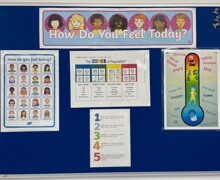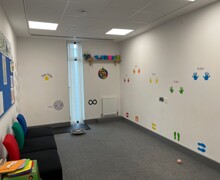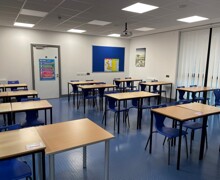The Dommett Centre
Specialist Resource Provision for autistic students
- The Autism provision can provide support for up to 24 children who have a diagnosis of Autism and an Education Health and Care Plan (EHCP) for Communication and Interaction.
- Our focus is on building successful inclusion in the academy and the amount of time each child spends in their mainstream classroom is specific to each child with a minimum expectation of 60-80% of a mainstream timetable.
- Children will access specialist interventions and support in the SRP as well as in their classroom as appropriate. There are no lessons taught in the SRP.
- Kent County Council have commissioned 24 places for students in Key Stage 3 and 4 for the current academic year.
- Potential students will be those with an EHCP for Autism (Primary Need) who have been discussed at the SRP panel before KCC make the final decision. This is dependent on assessment of the child’s needs, alongside their appropriateness to be educated with the existing children on roll in the Provision.
- Students with a high level of Social, Emotional & Mental Health (SEMH) needs, those with a complex profile such as Pathological Demand Avoidance (PDA) or with a conduct disorder such Oppositional Defiance Disorder (ODD) are not suitable for an SRP placement..
Specialist Interventions
- Specialist interventions can be delivered in the SRP but also accessed through our in-reach programme where mainstream students with an autism diagnosis can be referred for support. These include:
- Talkabout – a structured programme for teaching and measuring social skills which starts by developing a child’s self-awareness and self-esteem before progressing onto body language, conversation skills, friendship skills and assertiveness.
- Lego Therapy – a social development programme for children and young people with Autism Spectrum Disorder (ASD) and other social communication difficulties.
- Recognising Emotions – these exercises are intended for Key Stage 2 and 3 students who have difficulty in reading expressions, in recognising the state of mind of other people, or in knowing how they themselves feel. The exercises could be useful to pupils who are understood to be on the autistic spectrum, but also for any student who has difficulty in perceiving emotion in themselves and others.
- Incredible 5-point Scale – assisting students in understanding social interactions and controlling their emotional responses.
- The Autism Workbook – an 8-week programme developed to help students understand their diagnosis and what it means for them and for those around them.








